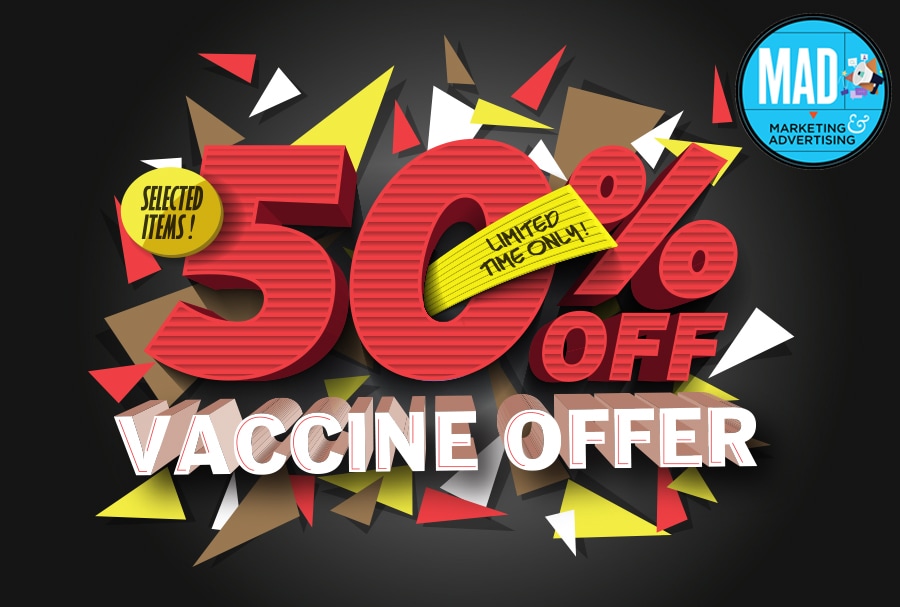Brands incentivise Covid-19 vaccination: Shot in the arm or short-sighted?
Brands are doling out offers to cash in on the inoculation drive in India. It is good to remember, however, that the customer is not a moron


 Brands of all shapes and sizes are doling out offers to incentivise people to get vaccinated against Covid-19.
Brands of all shapes and sizes are doling out offers to incentivise people to get vaccinated against Covid-19.
Image: Shutterstock
The customer, David Ogilvy proclaimed in the 1950s, is not a moron. “She"s your wife," said the father of advertising, codifying his priceless wisdom in the book ‘Confessions of an Advertising Man’, published in 1963. He went on to sound a word of caution: You insult her intelligence if you assume that a mere slogan and a few vapid adjectives will persuade her to buy anything. “She wants all the information you can give her," Ogilvy underlined.
Almost six decades later, back in India, marketers have forgotten the lesson, the warning, and the ‘wife.’ In a mad scramble to appear as social evangelists, brands of all shapes and sizes are doling out offers to incentivise people to get vaccinated against Covid-19. To be honest, the incentives do look appealing.
Take, for instance, Domino"s "Get vaccinated and get Rs 400 off," McDonald’s India"s 20 percent discount offer, Beer Café’s 10 percent discount on first jab and 20 percent discount on the second jab, IndiGo airline’s discount of up to 10 percent, or Godrej Appliances’ six months free extended warranty. The list is endless as the discount vaccine tail grows with every passing day.
So what’s wrong with it? Brand custodians argue that incentives are a great way to induce people to get vaccinated. In short, it will go a long way in protecting people and nation. Right? Wrong.
Remember Ogilvy’s word of caution? Don’t insult the intelligence of ‘wife’—read customer—by adding ‘conditions apply.’ Domino’s Rs400 offer is not on one order, but has a cap of Rs100. It means you have to order four times to avail a discount of Rs400. There is another rider: The offer is applicable only if you are ordering from the Domino’s app. Now, poor consumers who are vaccinated but don’t have the app can’t avail ‘ek chota sa thank you’ (small thank you) from the biggest pizza player in India. Ditto for McDonald’s. One needs to place the order from the app and not from online food aggregator platforms like Swiggy to avail the offer.
The free warranty by Godrej Appliances comes into play only if one buys new appliances. Kamal Nandi, business head and executive vice president of Godrej Appliances, explained the move in a press release last week. Vaccine hesitancy, he argued, remains a very real barrier. The need is, therefore, to take tangible action. “We have launched [a] thoughtfully crafted 6-month extended warranty free, on purchase of any of our B2C products to customers who have taken at least one dose of the Covid-19 vaccine," he underlined. The move, he claimed, was welcomed by trade partners and customers. “It’s a small measure from our end in this fight against Covid-19," he added.
Brand and marketing experts are not amused by the ‘fight’ displayed by a bunch of brands. “It is vaccine vulture-ism," says Harish Bijoor, who runs an eponymous brand consulting firm. Vaccine-led incentives are a terrible example of ‘moment marketing’, he explains.
While acknowledging that vaccination is the biggest talk point across the world, brands need to understand if there are tangible gains to be made or if they are just scoring brownie points. Moreover, brands can’t be overtly pushy in communication and proposition. So, one can’t say offer valid only when the customer buys new items or uses the brand app. Second, do brands really think that discounts will nudge people to get vaccinated, Bijoor asks. “There is a very thin line between smart advertising and promotion, and vaccine opportunism," he says.
Some experts label the trend as FOMO (fear of missing out). “Everybody is displaying herd mentality," says Ashita Aggarwal, marketing professor at SP Jain Institute of Management and Research. Though the upside is that a brand is seen to be on the side of the majority, the flip side is that it doesn’t help in improving brand preference. Brands, she says, can find place in consumers’ heart if they join the movement to educate people on Covid-appropriate behaviour. “Using vaccination as sales promo opportunity is not the right kind of jab," she adds.
Meanwhile in the US, marketers continue to swear by Ogilvy’s Bible. There are no ‘hidden conditions’ or sales push. Take, for instance, the offer by beer major Anheuser-Busch. All adults above 21 years of age would be eligible for a free beer when 70 percent of Americans get at least one Covid-19 vaccine shot by July 4, America’s Independence Day. US President Joe Biden has endorsed the campaign. “Get a shot and have a beer," he reportedly said. “Free beer for everyone 21 years or over to celebrate the independence from the virus."
Then there is donut major Krispy Crà¨me that has rolled out a nationwide incentive of a free glazed doughnut to any adult with a vaccination card in the US. In May, Andrew Cuomo, the governor of New York, reportedly announced that lottery tickets priced $20 will be given free to people above 18 years of age if they get vaccinated. The scratch-off lottery tickets carry a maximum prize of $5 million and a minimum of $20.
Back in India, offers on the table do not seem to be appealing enough to either move the needle, or convince the ‘wife’, who is certainly not a moron.
First Published: Jun 28, 2021, 09:53
Subscribe Now